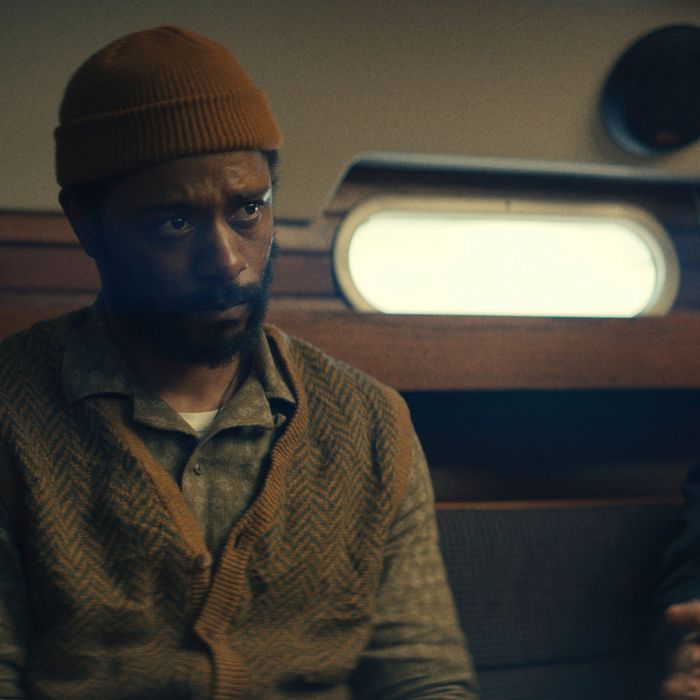
The most frightening nightmares are the ones we can’t wake up from, and once the lines between reality and fear are blurred, things become more terrifying. Apollo’s living and dreaming his personal nightmare, dealing with painful grief when awake and disturbing memories while asleep.
Still reeling from the loss of his family, Apollo’s barely holding on, but his will to live is temporarily reignited by the opportunity to sell his signed copy of To Kill a Mockingbird to William, the IT guy who showed up at Apollo’s grief support group. The guy is a straight-up weirdo; he instructs Apollo and Patrice to meet him on a dock so they can do the book sale on a random boat. Patrice is visibly uncomfortable by William’s vibes, but Apollo couldn’t care less about Patrice’s feelings because he found out that his dear friend has been interacting with a social-media tribute page for Baby Brian.
Brian’s tribute page disturbs Apollo; among the positive support are comments clearly from trolls, adding another layer to this modern fairy tale: Apollo’s trolls don’t live under bridges but behind screens. One in particular, with the username Kinder Garten, posts especially deranged messages, all hatefully playing off of what happened in that room with Emma, Brian, and the teakettle (thank goodness we didn’t have to watch, but these comments tell us everything we need to know). For example, one referred to Apollo’s child as “Baby Back Ribs,” and another was a declaration that they would enjoy a meal of boiled vegetables inspired by Brian. Apollo constantly checks the page in a self-flagellating way, even scrolling through the feed after he wakes up from a nightmare.
Once on the boat, Patrice and Apollo give William the rare book, which they’ve wrapped like a present. The wrapping dislodges something in William emotionally, and he goes on a rant about his estranged wife, Gretta, and their two daughters. As an attempt to get Gretta back, William wants to gift her the book since her father used to read her To Kill a Mockingbird every night. William believes Gretta’s father wanted to instill in her what being a good father meant, but he tells Patrice and Apollo that he doesn’t think he shaped up to be anything like Atticus Finch. Patrice points out that not even Atticus was Atticus, referencing the book’s sequel, Go Set a Watchman (if you haven’t read the book, just know that Atticus’s character is expanded upon unfavorably).
After selling William the book, Apollo returns to attempting to pick up the pieces of his life without Brian and Emma. He meets with Emma’s sister, Kim, and gives her $10,000 in exchange for helping his mother organize Brian’s funeral. Once she leaves, he says good-bye to the Valentines, thinking this is the end of his journey with Emma’s family. Almost instantly, he begins to receive texts from an anonymous number claiming to know where Emma is. The number drops a location pin, sending Apollo on a trek through the city to Grant’s Tomb, where William is waiting.
William declares to know exactly where Emma is, claiming that he enlisted the help of some sort of hackers to try and find Apollo’s wife. He sends Apollo a file filled with CCTV footage of Emma arriving at the ferry. Emma is apparently on an island in the East River that can be traveled to only by a boat, which, of course, William coincidentally has access to. The guy is weird, creepy, and invasive, but Apollo is desperate and reckless enough to do anything to find Emma, including getting on a boat in the middle of the night with someone who looks anything but trustworthy (seriously — he looks like a caricature of every predator in every show that’s ever existed).
The episode begins to push the fantasy element once Apollo and William embark on their voyage to the island. One of the oldest fantasy tropes is the quest narrative, and in a story that revolves around books and ancient folklore, it’s only natural that our protagonist must go on a quest. Quest narratives usually feature a hero who follows the three stages of what writers call “the Hero’s Journey”: the departure, the initiation, and the return. The catalyst for the Hero’s Journey is often some sort of disruption from the outside world that leads to a call to action, which then sends the hero, often reluctantly, on a quest. The beginning episodes depicted the catalyst of Apollo’s quest narrative, and now we’re witnessing him embark on the first phase of the Hero’s Story: the departure.
Fantasy fans can immediately recollect their favorite hero’s departure, whether it’s Bilbo Baggins going with Thorin or (Star Wars is science fiction, but it still works as an example) Luke Skywalker heading to Alderaan with Obi-Wan; the departure is critical. William and Apollo’s departure begins on a boat that William is more than capable of driving, though he previously claimed he had zero boating skills. Apollo vomits after being triggered by memories of his date on the river with Emma, particularly remembering when she said if she were to kill herself, she would jump off the George Washington Bridge. As they pass under the bridge, he removes his wedding ring, throws it in the water, and replaces it with the red string that he has kept ever since cutting it off Emma’s wrist. Then Victor LaValle narrates: “Would you even know if you crossed into a fairy tale? … There are portals in this world that we may never know we’ve trespassed through.” Our hero has crossed a threshold and has plummeted into a fantasy.
Once the pair make it to the island, William reveals that Gretta rejected his gift and, instead of moping around, he’d rather help Apollo with his mission. The two stumble upon abandoned bathtubs and realize they’re on North Brother Island, which was once home to a quarantine hospital where Typhoid Mary was forcibly admitted. They make their way to a building where William believes the Wise Ones are residing. Apollo begins to yell, “I am the god Apollo! I come for my revenge!,” calling for Emma frantically until a group of hooded women brutally attacks him and drags him to meet their leader, Cal.
Cal, whose full name is Callisto (likely after the Greek nymph), is cunning and captivating with the energy of a cult leader and warrior. She shows Apollo puppets she’s making to perform the Grimm version of “Rapunzel,” emphasizing the enchantress who forced Rapunzel’s parents to give her their baby at birth as punishment for stealing from her garden. But Apollo isn’t trying to hear all that; when he interrupts Cal, asking for Emma’s whereabouts, Cal reminisces about another time a husband came to visit her community, bringing with him “two guns and a ton of rage.” He ended up killing three women and several children, so they “left the world” and came to the island, where they’re now armed, ready to fight off any man.
Returning to her story, Cal says that “Rapunzel” is about how parents go to great lengths to protect their children, but “no matter what they do, the world finds a way in.” She goes on to say that the question of how to protect our children is as old as fairy tales themselves, saying that “the new fears are the old fears, and the old fears are ancient. But when it’s our turn to face them, they are made new,” which is an excellent rumination on parenthood and humanity. Cal begins to speak through the puppet enchantress, who has a little red string tied around her wrist, discussing illusions in which something pretends to be something it’s not. When she asks Apollo if he knows what she’s talking about, he responds, with a tear rolling down his cheek, “It’s not a baby,” before saying that if something’s an illusion, that means someone created it.
Before Apollo can speak to Cal any further, they’re interrupted by William yelling. Cal is furious that Apollo isn’t alone and, along with two other women, drags the men to a new location on the island, where she personally beats William’s ass with a club after realizing that he’s Gretta’s husband from a picture on his phone. She says they should call Gretta, as she’ll want to be there when they kill him. The women lock them each in a large cage, and Cal tells Apollo he needs to decide if he’s ready to “eat a large slice of humble pie.”
Imprisoned across from a bloodied William, Apollo asks William to tell him the full truth because, obviously, there’s much more going on. William admits to searching for the island for months before Apollo brought them right to it. He says that since he’s Norwegian, he’s been on boats since he was a baby and already knew how to sail. Next, he confesses to knowing who Apollo was before they met, having initially heard about Emma giving birth on the train, and at the moment, he “just knew” they were going to be friends. He loved the story of Brian’s birth so much that he wanted to find a happy ending for Apollo’s family since he couldn’t have one of his own. But he buries the lede: It turns out, at the instruction of Cal, Gretta did the same thing to one of their daughters that Emma did to Brian. He frantically says he “called in the cavalry,” though he doesn’t specifically say who/what this cavalry is. Instead, he levels with Apollo, saying Emma may be alive, but the women on the island won’t be of any help.
William gives Apollo an ultimatum: If Apollo wants his help finding Emma, Apollo will have to help him as well. He speaks emotionally about wanting to be reunited with his family, and since Cal has plans to kill William but is allowing Apollo to humble himself, William thinks Apollo is his last chance. Apollo isn’t fully swayed, but William says he has no choice — and if he doesn’t help, everyone on the island will die. The episode ends with our hero at a crossroads, being called to embark on the rest of his Hero’s Journey whether he wants to or not.
Apollo’s Bread Crumbs
• Jane Kaczmarek as Cal, a.k.a. the mom from Malcolm in the Middle, is so funny, but once I got past seeing her as her sitcom character, she did a wonderful job.
• Water remains a major theme of the show — Lillian is also shown in the episode, both in her past and in her present, visiting the East River with a mysterious suitcase filled with something nefarious.
• Toni Morrison once wrote that “all water has a perfect memory and is forever trying to get back to where it was.” This aligns with LaValle’s narration discussing buried memories and how our evolution traces back to prehistoric underwater predators. What else could be lurking in the water, where all of life’s memories reside?




